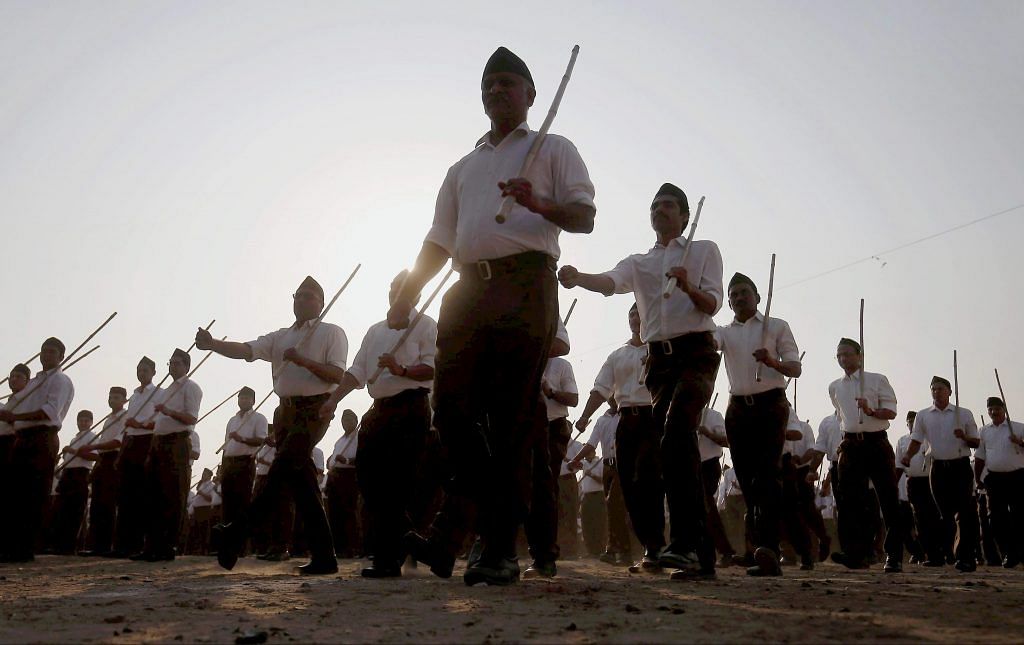Vigilantism is inherent in the mission that the Rashtriya Swayamsevak Sangh (RSS, National Volunteer Corps) assigned itself from its inception, its aim being to work at the grassroots level to organise the Hindus and defend their interests.
The founder of RSS in 1925, K.B. Hedgewar, told the Swayamsevaks once:
‘Remember, we have to organise the entire Hindu society from Kanyakumari to the Himalayas. In fact, our main area of operation is the vast Hindu world outside the Sangh.’
He developed the shakha technique to this society-oriented end, as shakhas are the local branches of the RSS where volunteers meet in uniform every day for physical and ideological training.
Hedgewar’s successor, M.S. Golwalkar, confirmed in the 1930s–40s that the RSS, in contrast to the Hindu Mahasabha of V.D. Savarkar, was not interested in playing a political game in order to conquer state power. In We, or Our Nationhood Defined (1938) he explains that the priority is to build the Hindu nation from below, not to capture the state: ‘We are out to understand the Nationhood of Hindusthan, which done, all questions regarding the form of “state” shall be worth entrusting to the “Nation” as we find it to exist.’
To build this Hindu Rashtra primarily implied not only to persuade Hindu society to adhere to the worldview of Hindutva (including the interpretation of history and the depiction of the minorities propagated in the shakhas), but also to enforce traditional rites and practices.
One of the mainstays of this orthopraxy was the caste system, which Hindu nationalist ideologues defined on the basis of the antiquarian Varna Vyavastha. The most influential one, Deendayal Upadhyaya, emphasised the need to restore this organic social arrangement because in the Hindu ‘concept of four castes, they are thought of as analogous to the different limbs of Virat-Purusha … These limbs are not only complementary to one another, but even further, there is individuality, unity. There is a complete identity of interest, identity of belonging.’
Also read: Sardar Patel wanted RSS to be merged into Congress but Nehru & Golwalkar stood in way
To promote such unity, the RSS did not turn to the state which, according to Upadhyaya, never played a major role in India’s history: only a grassroots organisation like the RSS could achieve it in a long-term perspective.
While the RSS relied on social work and persuasion to implement this agenda, it never ruled out the use of constraint and violent means. In fact, the Swayamsevaks not only wore a paramilitary uniform and observed quasimilitary discipline, but they were also trained to ply the lathi in the shakhas.
This other face of the Janus-like organisation that is the RSS reflected another dimension of its mission: it had to defend Hindus against other groups comprising Indian society, starting with the Muslims, and even the Hindus who would interfere with the organisation’s agenda. This aspect of the RSS’ story asserted itself at the time of crisis.
After Partition, M.S. Golwalkar, leader of the RSS, gave an enlightening speech in this regard—transcribed by the intelligence services, whose report can be consulted at the Nehru Memorial and Museum Library:
On 8.12.47 at 5 P.M. about 2500 volunteers of the Sangh collected in their camp on Rohtak Road. After some drill, M.S. Golwalkar, the Guru of the Sangh addressed the volunteers. He explained the principles of the Sangh and said that it was the duty of every individual to be prepared for facing the coming crises with full force. Very soon they would be placing a complete scheme before them. The time for mere playing had gone. Our volunteers should enrol new volunteers in every house, and should install in them the essence of Hinduism. Referring to the Government he said that law could not meet force. We should be prepared for guerilla warfare on the lines of the tactics of Shivaji. The Sangh will not rest content until it had finished Pakistan. If anyone stood in our way we will have to finish him too, whether it was Nehru Government or any other Government. The Sangh could not be won over. They should carry on their work. Referring to Muslims he said he had that no power on earth could keep them in Hindustan. They shall have to quit this country. Mahatma Gandhi wanted to keep the Muslims in India so that the Congress may profit by their votes at the time of election. But, by that time, not a single Muslim will be left in India. If they were made to stay here, the responsibility would be Government’s, and the Hindu community would not be responsible. Mahatma Gandhi could not mislead them any longer. We have the means whereby such men can be immediately silenced, but it is our tradition not to be inimical to Hindus. If we are compelled, we will have to resort to that course too. After this the address finished and fruits were distributed among the volunteers and then the meeting dispersed.
No outsider was admitted into this meeting.
Also read: RSS will decide if Modi comes back to power or not
Golwalkar’s speech of 8 December 1947 in Delhi indicates the RSS modus operandi. Its preferred method was to win over Hindu minds by persuasion.
This approach, which dates back to the movement’s inception, is revealing of its agenda in terms of societal and cultural transformation from below and shows that the conquest of state power was not its priority. But the movement has displayed a tendency to fight Muslims physically, to show its strength to Hindu opponents and to stand up against the government if it tries to get in its way, particularly when the organisation targeted Muslims.
Golwalkar made clear that following the establishment of Pakistan, India had to be rid of them. Violence, however, was legitimate not only against Muslims, but also against all those protecting them—such as Mahatma Gandhi, whom Golwalkar claimed was motivated by petty electoral intentions.
